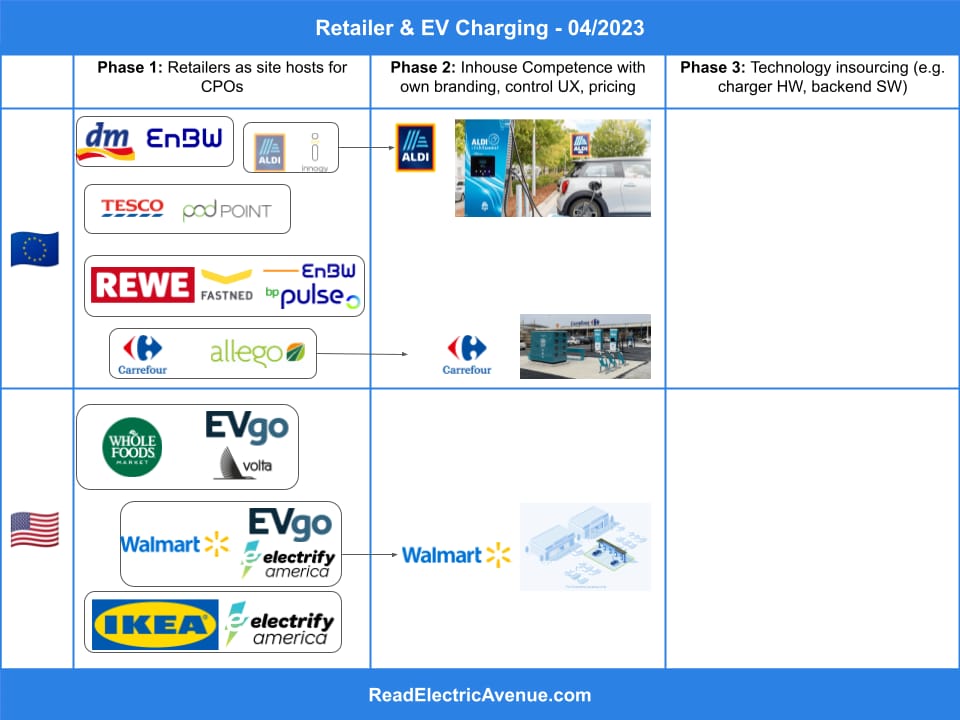Happy Monday. This is Electric Avenue - the newsletter that's your trusted sidekick in the EV industry. We're the Robin to your Batman 🦇.

Here's what we have for you today:
Goodbye gas station 👋
3 Links 🔗
Meme of the week 🤡
Let's get into it!
Goodbye gas station 👋 - The Evolution of Retailer charging 🛒
Gas stations suck.
They're located at busy and noisy intersections. There's tons of fumes in the air.
The food is bad and overpriced. The spaces are not inviting to hang out for more than a couple of minutes.
What if I told you that you could fill up while shopping at your favorite local retailer?
Think Wholefoods with their variety of healthy, hot food options. Think Walmart or Target which often include a Starbucks and other restaurants.
Think weekly grocery stops like the ones Germans do at REWE and Aldi, French at Carrefour and Brits at Tesco.
Is that something you might be interested in?
Well, good news! Electrification is making this a reality.
A number of retailers have realized that providing EV charging as an additional amenity provides a huge opportunity.
A great example is Walmart's recent announcement to install fast charging across thousands of US locations by 2030.
This would be in addition to the almost 1,300 EV fast-charging stations they already have available at more than 280 U.S. sites. Today these chargers are part of Electrify America and EVgo charging networks, but now Walmart will be taking this inhouse.
Approximately 90% of Americans live within 10 miles of a Walmart location. Combined with Walmart's pledge to follow their corporate motto and offer Every Day Low Price charging - this could be a game changer.
To zoom out, we've looked at the fast charging efforts of major retailers in Europe and North America.
We see three distinct phases of charging infrastructure deployment for these retailers:
Phase 1: Being a site host for independent CPOs (=Chargepoint Operators).
Phase 2: Inhouse charging teams establish a Retailer-branded charging network where the Retailer can control the User Experience.
Phase 3: Further insourcing as needed on core value chain components like installation, charger hardware, cloud software and charger maintenance.
In Phase 1, the retailers partner with one or multiple charging networks to serve as site hosts. Retailers receive a fixed lease fee from the CPO over a 5-15 year term. The profit/loss responsibility and energy pricing authority lies with the independent CPO (e.g. Electrify America).
In Phase 2, retailers contract out the installation and operation of a charging network but will do the operation under their own brand. Core user experience components like the driver mobile app, pricing structure and charger display user interface can be determined by the retailers. The installation & operation partners are often the same networks as in Phase 1, as many of them also offer white label services (e.g Electrify America with its Electrify Commercial division and EVGo with its eXtend offering). The profit/loss responsibility lies with the Retailer now.
In Phase 3, retailers take further aspects of the network operation in-house. This usually covers installation and maintenance but one could think of scenarios where a retailer may go as far as developing their own cloud backend or even manufacturing their own charging stations. Phase 3 might seem far away today but for retailers with large scale there are additional benefits to unlock here:
create cost savings by leveraging synergies from existing competences (e.g. electricians maintaining electrical equipment at stores/warehouses)
spin-off benefits from fleet electrification - retailers will need to develop private depot charging to electrify their logistics and transportation fleet (see Walmart's deal to buy CANOO EV delivery vans).
integration of retail & charging services to create a unique customer experience with the goal to increase customer loyalty (e.g. paying for charging with loyalty program points).
Let's take a look at major retailers and their progression through these phases:

Take-aways:
Location, location, location 🎯: Retailers offer the most convenient location for EV drivers who can not charge @home or @work. Thus, for EV drivers reliant on public charging, retailer charging will be a USP and will increase loyalty among this customer group. Customers may also spend more time and money in the retail store while their car is plugged in as they're trying to match dwell time to charging time.
Charging = 🌭: For EV drivers with the possibility to charge @home / @work, we can see the possibility of "snack-charging" when it is convenient and cheap. Think of the $1 hot dog from IKEA or COSTCO.
Leveraging habits for predictability 🔮: For CPOs, retailers are highly attractive site partners. Having customers with long-established weekly habits of grocery shopping at their favorite retailer can ensure predictable utilization of charging stations.
Scale determines strategy 🛒: Transitioning from Phase 1 to Phase 2 requires a critical size of locations. We predict that smaller retail chains are more likely to stay in Phase 1. Retailers with large scale and high standardization across their business are more likely to migrate to Phase 2 or skip Phase 1 altogether.
3 Links 🔗
RAM goes 800V ⚡: Stellantis used the New York Auto Show to launch the RAM 1500 Electric pickup truck. Key facts are up to 500mi of range (on an optional 229kWh battery pack) + up to 110 miles of range added in approximately 10 minutes with 800-volt DC fast charging at up to 350 kW. We'll have to see how they solve the boost charging problem on Tesla's network.
Audi expands ⛳: After Nuremberg and Zurich, the 3rd Audi fast charging hub is now open in Berlin. For a comparison of Automaker-owned charging networks see: Should EV OEMs own charging stations?
Tesla sets records 💪: Q1/2023 was another record quarter for Tesla with a total of 440,808 manufactured and 422,875 delivered EVs. These figures are 4% higher than the already record-breaking figures of Q4/2022. (Link).
EV Memes of the Week 🤡


That's a wrap for this week! Let us know how you feel:
What do you think of today´s edition?
Reader Review of the Week
Selected ⚡️⚡️⚡️⚡️⚡️ Freakin´ awesome and wrote:
"Electric Avenue - best weekly EV newsletter. love the memes!"
Someone forwarded this to you? Subscribe now - it's free!
DISCLAIMER: None of this is financial or tax advice. This newsletter is strictly educational and is not investment advice or a solicitation to buy or sell any assets or to make any financial decisions. The Electric Avenue team may hold investments in the companies discussed.


